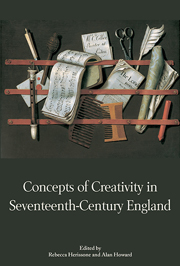Book contents
- Frontmatter
- Contents
- List of Illustrations
- List of Contributors
- Preface
- Introduction
- Creating to Order: Patronage and the Creative Act
- Creative Identity and the Role of Print Media
- Mapping Knowledge: The Visual Representation of Ideas
- Authorial Identity
- Imitation and Arrangement
- 9 A Meeting of Amateur and Professional: Playford's ‘Compendious’ Collection of Two-Part Airs, Court-Ayres (1655)
- 10 ‘Creating’ Cato in Early Seventeenth-Century England
- The Performer as Creator
- Bibliography
- Index
10 - ‘Creating’ Cato in Early Seventeenth-Century England
from Imitation and Arrangement
Published online by Cambridge University Press: 05 March 2014
- Frontmatter
- Contents
- List of Illustrations
- List of Contributors
- Preface
- Introduction
- Creating to Order: Patronage and the Creative Act
- Creative Identity and the Role of Print Media
- Mapping Knowledge: The Visual Representation of Ideas
- Authorial Identity
- Imitation and Arrangement
- 9 A Meeting of Amateur and Professional: Playford's ‘Compendious’ Collection of Two-Part Airs, Court-Ayres (1655)
- 10 ‘Creating’ Cato in Early Seventeenth-Century England
- The Performer as Creator
- Bibliography
- Index
Summary
When Richard Brathwaite compiled his The Scholler's Medley of 1614, he justified his use of fragmentary portions of Roman history by claiming that they were of the utmost utility to his readers. In recording and scrutinizing the lives of significant individuals, Brathwaite wrote, history ‘truly demonstrates the life of the person, characters his vertues, or vices’. History, then, in the minds of most seventeenth-century gentlemen, recorded the deeds of the great, the good and the downright wicked in order that they might be preserved for posterity and prove useful in later times:
Many worthy Statists haue desired, and in themselues no lesse deserued … to haue their memorable acts recorded: as Cicero his withstanding Catyline, Cato his opposing Caesar.
This essay explores how the ‘memorable acts’ of Cato of Utica were received, reinterpreted and reconstructed in early seventeenth-century England. Marcus Porcius Cato the Younger was an ardent opponent of unconstitutional rule at Rome during the last days of the Republic; the strength of his convictions led him to conclude that death was preferable to continued existence under the tyranny of Julius Caesar. It was this very integrity that rendered him a problematic historical figure in the early modern context, an individual upon whom competing philosophies and ideologies converged. Cato's actions were enshrined in historical fact in the ancient sources, and could not be altered. But early modern retellings of the story of Cato placed different emphases upon his deeds, and constructed very individualized characters for this Stoic stalwart.
- Type
- Chapter
- Information
- Concepts of Creativity in Seventeenth-Century England , pp. 233 - 252Publisher: Boydell & BrewerPrint publication year: 2013

